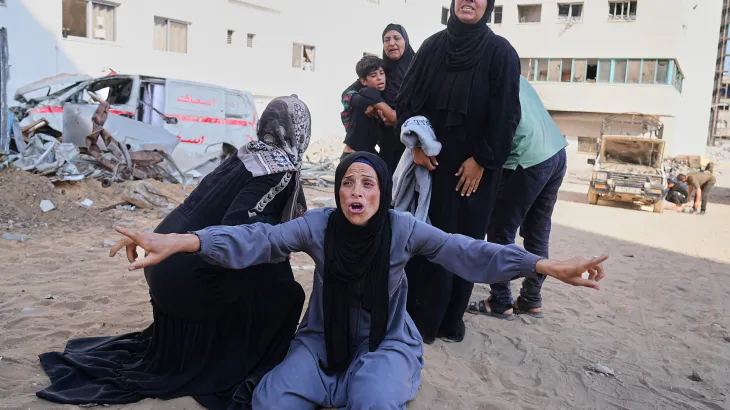At least 72 Palestinians have been killed by Israeli fire across Gaza on Wednesday, including 29 people who were waiting for aid trucks, Palestinian health officials say, the latest carnage hitting people desperate to secure food for their hungry families.
The latest incidence of the daily killing of Palestinian aid seekers in recent weeks took place early on Wednesday on Salah al-Din Street near the Netzarim Corridor in central Gaza, medical sources told Al Jazeera. More than 100 others were wounded in the attack, they said.
In other deadly Israeli strikes across Gaza, eight people were killed, and others wounded, in an air strike on a home in the Zeitoun neighbourhood south of Gaza City, medical sources told Al Jazeera.
Eight more people were killed, and others injured, in Israeli strikes on tents of displaced people in al-Mawasi camp in Gaza’s south, medical sources told Al Jazeera. The victims included a woman and two children, the Palestinian news agency Wafa reported.
Another strike took place on the Maghazi camp in central Gaza, news agencies reported, citing medics. Wafa reported that 10 people, including a husband, wife and children from a single family, were killed in the strike.
Hamas condemned Israel’s assault on residential areas across the enclave, as well as its targeting of aid seekers at distribution points managed by the contentious US- and Israeli-backed Gaza Humanitarian Foundation (GHF).
“The systematic abuse of innocent civilians, the escalation of massacres, the targeting of the starving, forced evictions, and the shrinking of areas the occupation claims are ‘safe’” amount to war crimes, the group said. Israel’s attacks are “part of the brutal war of extermination that has been ongoing for nearly 20 months”, it added.
The Israeli military, when asked for comment, told the Reuters news agency that it was looking into the reported deaths of people waiting for food aid. Regarding the other reported strikes, it claimed it was “operating to dismantle Hamas military capabilities” and taking “feasible precautions to mitigate civilian harm”, Reuters reported.
‘He went to get a bag of flour’
The GHF began distributing a trickle of food aid in Gaza at the end of May after Israel partially lifted a nearly three-month total blockade on food, medicines and other essential items, leading to fears of famine for the population of 2.3 million. No other aid has been allowed in by Israel, which in effect has kept the punishing blockade in place.
Israeli mass killings of aid seekers have become a grim daily occurrence amid the chaotic scenes as desperate Palestinians are given a narrow window to rush for food.
The United Nations and major humanitarian groups have refused to cooperate with the GHF, citing concerns that it prioritises Israeli military objectives over humanitarian needs and bypasses organisations with decades of experience in providing food and medicine at hundreds of locations to the entire population of Gaza.
Ahmed Ghaben told Al Jazeera about the death of a relative: “My nephew went to bring his children a bag of flour, but he was brought back a lifeless body, as you can see, a martyr. He left 14 family members. He went [to get aid] due to hunger. He wasn’t a resistance fighter. He went to get a bag of flour.”
Al Jazeera’s Tareq Abu Azzoum, reporting from Deir el-Balah, said, “It’s very clear that Israeli forces are targeting civilians who only went to get bags of flour or boxes of food. Eyewitnesses say the soldiers used a variety of weapons, including drones and tanks. Snipers who have been deployed in nearby hills have also been gunning down the civilians.
“The Israeli military claims these hungry crowds are a security threat, but these claims have not been substantiated with clear evidence.”
On Tuesday, Israeli troops killed at least 70 Palestinians and wounded hundreds as they sought aid in Gaza on the deadliest day of violence at the sites so far.
Gaza’s Ministry of Health said on Tuesday that 397 Palestinian aid seekers had been killed and more than 3,000 wounded since distribution resumed in late May.
The attacks come as Gaza’s Health Ministry said that the death toll had risen to 55,637, with 129,880 wounded since the conflict erupted in October 2023.
The ministry also issued a warning about serious fuel shortages, saying that the territory’s few operational hospitals had only enough fuel to last three days.
The ministry said that Israeli forces were preventing international aid groups and UN organisations from accessing fuel storage sites for hospitals under the pretext that they were in so-called “red zones”, threatening the shutdown of hospitals that rely on generators for power.
In the meantime, with much of the world’s attention on the Israel-Iran conflict, and what the United States may or may not do, a top leader of the Houthis in Yemen, one of Iran’s key allies, said they will keep up their support for Palestinians in the Gaza Strip until Israeli “aggression stops, and the siege is lifted”.
“Our operations in support of Gaza will not cease, no matter the sacrifices”, said Houthi-backed president Mahdi al-Mashat in a statement Wednesday.


